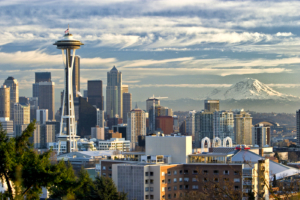 If you were told that Seattle is breaking records, you’d probably think it was about coffee or rainy weather — but this milestone is a lot more worrisome. Seattle has caught up with San Francisco in income inequality and its residents are feeling it.
If you were told that Seattle is breaking records, you’d probably think it was about coffee or rainy weather — but this milestone is a lot more worrisome. Seattle has caught up with San Francisco in income inequality and its residents are feeling it.
Most of the city’s income went back into the hands of its rich who gained an average of $40,000 annual income over the past year. At the same time, its poor continue to lose income and are either forced to live outside of the city, or are living on its streets and under its freeways.
Metrics of inequality: Gini Index
A Gini Index is an analysis of the measure of inequality, where zero represents the total income distributed equally across all homes. In the United States since 2006, a city’s Gini coefficient is tallied by the Census Bureau. According to Seattle’s Gini Index, the city sits at a 50.4, while the notoriously unbalanced San Francisco is at a 50.3. Seattle’s rapid jump up the list is one of the largest increases in the nation. Only two years prior, it was ranked sixth (still bad) in terms of income inequality.
Seattle’s politicians have taken taken measures to curb this unfortunate trend with an increase to the minimum wage and an attempt to tax its wealthiest citizens which is still winding its way through the court system. Still, the top 20 percent continue to hold more wealth than the bottom 80 percent combined. This has left many looking for answers.
Growing income inequality
Marxists know that capitalism cannot solve this crisis. As long as capitalism survives, inequality in Seattle and elsewhere will likely get worse because the insatiable greed of the capitalist class knows no limit. The existence of the socialist camp as a counter example plus a more militant labor movement was for some time able to put a check on this characteristic, but for several decades now the gap between rich and poor nationwide has increased due to increased exploitation combined with neoliberal policies. Today 1 percent of the population controls nearly 40 percent of nationwide wealth.
At the nation’s capitol, President Donald Trump and the Republican Party recently introduced a tax plan that will inescapably escalate economic disparity. The Tax Policy Center said: “The largest benefits, in dollar and percentage terms, would go to the highest income households.” CEOs (like Trump), shareholders, and individuals who inherit money will be the main beneficiaries from this tax plan, which has even received condemnation from the IMF.
The situation is bleak in the Emerald City. What’s left of the “middle class” continues to rely increasingly on credit to pay for shelter and education. The wealthy go on to influence politics and people’s lives, absorbing nearly all the value that has been created by the many.
Meanwhile the poor, many of whom are without homes, continue to work hopelessly on Seattle’s wet streets. In Seattle, the need for socialism has never been more apparent, and the need will be even greater tomorrow!
The silver lining is that a new generation of activists, workers, teachers and students who are less and less susceptible to Cold War propaganda who are demanding better for themselves and the world: the right to go to school without debt, the right to afford to live, the right to a home, and the right to be employed — in short, the right to a decent life.






